Brian Clegg's Blog, page 25
December 6, 2022
The Bah Humbug popstars
 Image from Unsplash
I gather from the i newspaper (3 December) that music business millionaires are bemoaning their inability to have their Christmas songs thought of as classics by the public. Tom Chaplin of Keane is quoted as saying 'Getting a song in the [Christmas streaming] chart is like breaking into Fort Knox'.
Image from Unsplash
I gather from the i newspaper (3 December) that music business millionaires are bemoaning their inability to have their Christmas songs thought of as classics by the public. Tom Chaplin of Keane is quoted as saying 'Getting a song in the [Christmas streaming] chart is like breaking into Fort Knox'. I accept that streaming has made it more difficult to get your Christmas song into the canon - but, honestly, my suspicion is that the majority of songs on offer simply aren't good enough to make it. Once you get compared with the best of all time, it inevitably becomes a lot harder than it is if you are only being put up against the best from this year's crop. It's a bit like a serious music composer complaining that Monteverdi, Mozart or Vaughan Williams still get a look in. But is that really a bad thing?
The fact is that songs do get added to the best of the bunch if they really stand out as far as the particularly odd calculation of what makes a good Christmas song is concerned - and, let's face it, that includes a whole lot of other things than pure musical quality. But if a song really does catch the attention of the public, it will get listened to and bump up those Christmas streaming revenues, even if it doesn't get into the top ten.
I personally enjoy a whole mix of music at Christmas. I've always sung in choirs and love a quality choir carol - but equally I'm happy to listen to a whole range of Christmas songs: both classics such as Fairytale of New York, and more recent releases like Keane's. The joy of streaming is both that you can pull in those old standards, and go for something less well known to build a playlist of your own favourites.
Incidentally, I know it's heresy, but for me, the best Christmas number by Keane isn't a Christmas number and it's in a cover version. My Christmas streaming playlist includes the Lilly Allen version of Somewhere Only We Know, which now feels Christmassy thanks to its association with the John Lewis Christmas advert: for me, this is better than the Keane original.
However, we can still do our bit to add to poor Tom's streaming revenue. I've included below his suggestion of his Christmas song that he thinks should be up there with the rest. (I checked - YouTube plays do now count in the streaming charts.) It is quite good, but Midnight Mass simply doesn't have the feel of a big Christmas hit. It's far too wistful and ballady. Be warned, incidentally: I also find the video somewhat generating of nausea. But it's not a bad song at all.
See all of Brian's online articles or subscribe to a weekly digest for free here
December 2, 2022
Improving Tim's daughter's Christmas
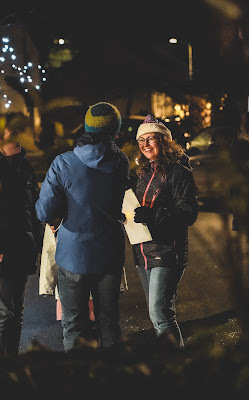 Image from Unsplash
I'm a big fan of the podcast
Cautionary Tales
by 'undercover economist' Tim Harford. In one episode, Tim tells us that his daughter prefers Halloween to Christmas because Halloween is more about community coming together, while Christmas is just for the family.
Image from Unsplash
I'm a big fan of the podcast
Cautionary Tales
by 'undercover economist' Tim Harford. In one episode, Tim tells us that his daughter prefers Halloween to Christmas because Halloween is more about community coming together, while Christmas is just for the family.This made me feel rather sad, but the good news for Tim's daughter is that this doesn't have to be the case. If Tim's family would like to go to a carol service - or a carol singing event - they'll get plenty of that community feel.
Of course, Tim and family may well be amongst the majority of Brits, according to the latest census results, who aren't Christians. And that's fine. If they were on holiday in an exotic location, they wouldn't avoid the local culture because they don't share the locals' beliefs. Similarly, it's entirely possible to enjoy the atmosphere and community spirit of a carol service without having any belief. And singing those tunes that are still familiar to most is a boost to the spirit.
So, Tim (and anyone else going bah humbug about Christmas) try out your local carol singing opportunities. For carol services, the best option is probably the A Church Near You website - put in your location, choose a local church (ideally one you can walk to, both because it feels good and most church car parks get overloaded for carol services) and you'll see their Christmas events almost certainly including a carol service. In my neighbourhood of North Swindon, it's happening at St Andrew's on 18 December with two carol services: 10am for children and 6.30pm for the more traditional version.
If you prefer to do it al fresco, many locations have outdoor carol singing events. Here we've got the Big North Swindon Carol Singalong on 21 December (raising money for the Swindon Night Shelter, so doubly community minded). It's under the tree at the Orbital Centre at 6.30pm. This kind of thing is slightly harder to pin down as there's no central website, but there could be info on your local parish council website or social media.
So if you're moaning about Christmas being too commercialised, want some community spirit or just fancy a good sing, head for the carols this Christmas.
November 28, 2022
Bring on the onshore wind
Doing something about climate change is essential. And as recent bills have shown, doing something about being self-sufficient in energy production is also essential. So who wouldn't love something that helps with both? The government's MPs, apparently. They seem to be distinctly against onshore wind turbines, a preference that also seems baked into the government's plans:
 A massive 64% of Conservative MPs think that most voters in their constituency would oppose wind turbines. But here's the thing. When YouGov asked the actual people, there was a very different picture:
A massive 64% of Conservative MPs think that most voters in their constituency would oppose wind turbines. But here's the thing. When YouGov asked the actual people, there was a very different picture: Over 70% of Conservative voters support wind farms in their local area. The overwhelming NIMBY attitude to wind turbines is a myth. Of course you can always find someone who will moan about having anything whatsoever built within a 10 mile radius of where they live. But they are in the minority on this one.
Over 70% of Conservative voters support wind farms in their local area. The overwhelming NIMBY attitude to wind turbines is a myth. Of course you can always find someone who will moan about having anything whatsoever built within a 10 mile radius of where they live. But they are in the minority on this one.From the stats, there's a vast gap between what Conservative MP think people want, and what the people actually want. This means that we are missing out on expanding a useful green energy source (with attached green jobs) as a result of MPs shooting themselves in the foot due to what can only be ignorance - as surely they wouldn't do this if they knew the facts.
If you're based in the UK and have a Conservative MP, why not contact them and point this out? I'm certainly going to be dropping an email to mine.
Data for graphics from YouGov; graphics from Steve Akehurst
This has been a Green Heretic production.
See all of Brian's online articles or subscribe to a weekly digest for free here
November 15, 2022
Engage, engage, engage!
 At the weekend I had the pleasure of appearing on literary agent Peter Cox's internet TV show
Litopia Pop Up Submissions
. In this, five brave souls provide a title, a blurb and the first 700 words of a book for comments from three industry experts and the extremely helpful online comments of viewers.
At the weekend I had the pleasure of appearing on literary agent Peter Cox's internet TV show
Litopia Pop Up Submissions
. In this, five brave souls provide a title, a blurb and the first 700 words of a book for comments from three industry experts and the extremely helpful online comments of viewers.This particular edition happened to have a focus on historical fiction, but I've done a few of these before and whatever the topic, one thing repeatedly comes across in that opening sample from the books - the author hasn't thought enough about how to engage their readers early on.
If you start a book with a set of facts (one example here was described as like reading a Wikipedia entry), you will rapidly lose your readers. Similarly, if the opening is totally introspective with nothing actually happening, an opening that is all tell and no show, it's hard for the reader to engage fully.
The 'show don't tell' thing is a hoary old piece of writing advice - but that doesn't mean that authors remember it. If you spend too much time telling us a character's thoughts or feelings, it's not a natural way to engage with them. If, instead, you show those inner aspects through the character's outer appearance and behaviour, it's effective because it's how we encounter others. Let your readers absorb the internals as much as is possible from the character's actions and words, rather than hit them over the head with an thought information dump. (Like all writing techniques, there are times when telling works superbly, but it's still a useful general guide.)
This excess telling came across very strongly with one of the submissions, where we spent the entire opening in the character's thoughts, but no one really did or said anything, even though he was a soldier, returning from war and a prison camp, surrounded by comrades.
Although this show was about historical fiction (though one submission seemed more an attempt at humorous historical fact), this advice applies to both fiction and non-fiction. Each involves storytelling. In the popular science world, for example, it's just as important to be conscious of your narrative. A collection of facts is not a book. In popular science we often bring in people and what they've done, rather than present the dry scientific content on its own. Alternatively, the author can frame the information they are presenting in a way that adds interest. If we are to escape producing a long-form Wikipedia entry we need always to be thinking about how to engage the reader - especially with those crucial opening words.
Here's the whole thing to see how it all turned out (note, by the way, there were some technical glitches, not usually present in these shows):
November 8, 2022
The great Twitter panic of 2022
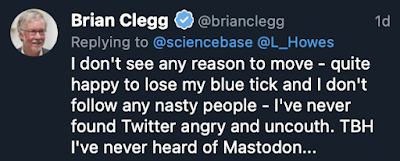 A fair number of people on Twitter have informed their followers that they have also set up on Mastodon just in case the world ends or some such. I don't doubt that Elon Musk could mess the whole thing up - but chances are things will stay fine in the Twitter world.
A fair number of people on Twitter have informed their followers that they have also set up on Mastodon just in case the world ends or some such. I don't doubt that Elon Musk could mess the whole thing up - but chances are things will stay fine in the Twitter world.Okay, I may lose my blue tick, which would be sad. I was told I ought to get one by an Olympic martial arts competitor, the way you do. We were at some sort of careers fair in Devizes (don't ask me why - I can't remember) and no one seemed to want to talk to either of us, so we chatted for a while and she was adamant that having a blue tick would make all the difference to my social media presence. But looking over the people I follow on Twitter, a mix do and don't have one and it's never made any difference to me - I certainly won't be paying getting on for £100 a year to keep it.
That apart, the outrage seems to be because Twitter may allow various dubious characters individuals back on. But for me, this is pretty much irrelevant. I mostly follow scientists and writers - all lovely people. I've never seen or had any abuse on this social media site that some consider a cesspit. (Perhaps because I don't generally follow politicians or activists.) It's a great way to keep up with the people I follow and, I hope, for people interested in my writing to keep up with me - and I can't see why that should change. Moving off Twitter seems to be cutting off your nose to spite your face.
As for the obscure social media site Mastodon - why? I'd never heard of it before this all happened - and most people still haven't. The way it's set up with its separate, individually owned servers seems in some ways rather dodgy - and it certainly seems ti have very limited ability to prevent exactly the type of content that those abandoning Twitter seem to be worried about. For that matter, apparently, any server could be switched off at any time, losing all your content.
it's much more sensible, I would suggest, to stick with Twitter, keep up the networks you've built and ensure the content continues to be as excellent as it has been to date... certainly within my bubble.
November 1, 2022
The Capture (Series 2) - BBC iPlayer
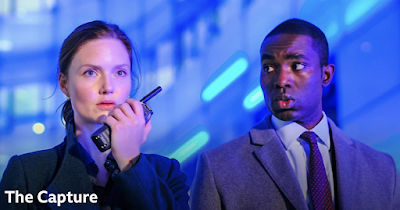 I don't usually review two seasons of a TV show separately, but I'd like to follow up my review of the first series of The Capture, partly because the second series is better than the first (though like the first it had some credibility issues) and partly because the political context (as opposed to criminal law) brings into sharper focus the way this kind of information technology can be misused.
I don't usually review two seasons of a TV show separately, but I'd like to follow up my review of the first series of The Capture, partly because the second series is better than the first (though like the first it had some credibility issues) and partly because the political context (as opposed to criminal law) brings into sharper focus the way this kind of information technology can be misused.As before, writer Ben Chanan proves good at giving us shocking scenes where deepfake videos and audio are used both to conceal what's really happening from security cameras and police radios and to replace broadcast video, totally twisting the content of a political interview. This seems to be intended to ruin rising political star Isaac Turner's career - though in reality things are far more complex.
We get the same state actors - MI5, CIA and SO15 - as in the previous season, plus Truro Analytics (surely not a name that is supposed to bring Cambridge Analytica to mind?), a political media manipulation agency.
Apart from a rather saggy fourth episode, Chanan keeps up the pressure and makes this a very engaging thriller that has significantly more at stake than the first season. Featuring as it does a government minister, the stakes are higher and the addition of the diva Newsnight presenter Khadija Khan (as before, hardly any of the characters are likeable) is a brilliant move.
It was, without doubt, my favourite TV watching of the last few months. In terms of its political message, I just wish it had explored the shades of grey more. The central technology to do those deepfakes, Correction, was being used by the government to manufacture evidence where they had good intelligence that there was terrorist activity, but not evidence that could be used in court. This is clearly the start of a very slippery slope (as this season shows) - but when the MI5/police operative DSu Gemma Garland is trying to sell it to our heroine DCI Rachel Carey, she just says what they are doing and why, which isn't convincing.
It would have been much more interesting to produce a hierarchy of moral/ethical decisions. Would Carey support killing terrorists in a war? Assassinating terrorist leaders (e.g. Osama bin Laden)? Police shooting to kill where it's necessary to preserve lives? Security services shooting to kill when it's necessary to preserve lives? Faking evidence to convict terrorists where there is clear evidence such as phone taps that can't be used in court for some reason? I'm not saying Correction is a good idea - but rather that knowing exactly where to draw the line is genuinely difficult decision.
However, that sort of moral consideration is perhaps too much to expect from a fast-paced thriller. The fact remains, this was excellent TV.
I'm going to finish off by pulling apart the last episode in some detail, as this is where the credibility issues that did irritate me loom large, so don't read on unless you've watched it all or don't care about spoilers.
See all of Brian's online articles or subscribe to a weekly digest for free here
===== SPOILER ALERT ======
For me, there was a feel of desperation about the final episode, as a sort of happy ending was shoehorned in at high speed - and it also left a lot unexplained. One problem was trivial - the head of Truro Analytics, Gregory Knox was seriously beaten up by Carey in the process of arresting him - but in all shots after this he didn't have a bruise on him. But the bigger problem was the way the denouement worked.
The show ends with an interview between the Newsnight presenter Khadija Khan and Isaac Turner - but Turner pulls out and the interview goes ahead with a deepfake of Turner being interviewed (with Khan's compliance), which is then used to unveil Correction to the world when Turner is shown to be actually in Piccadilly Circus, not in the studio.
One oddity here is that Turner is not in on the trick - so what would have happened if he hadn't pulled out of the interview? Of course, the whole thing could have then been a deepfake, but they couldn't do the reveal in Piccadilly Circus.
A second problem, once it's all explained is the incredible ability of Truro Analytics, which goes far beyond anything even vaguely feasible. The very premise that somehow you can improve someone's ratings by showing different aspects of them to key target audiences is fine on social media, but doesn't work on broadcast media. But also, it seems highly unlikely that Knox's company, which was no Google or Apple, could both do the social media manipulation and create perfect deepfakes in real time. Most painful was the company's ability to do full blown psychohistory - predicting what will happen down to the behaviour of individuals. This shows a total lack of understanding of chaotic systems.
And finally there's the big finish. The fake interview is taken over by replacing a huge chunk of the fake Turner's script. Carey is shown to be introducing the change with a click of the mouse. But we have been following her pretty well in real time, and at no point did she have the chance to write this script or somehow insert it into the system. What's more, once it is in play, it is somehow locked in - yet in an earlier scene they showed how easy it would be to edit the script on the fly - where has this ability to lock it in come from?
This didn't entirely ruin the ending - we did get our 'goodies triumph over the nasty intelligence people' moment. But it left it feeling a bit contrived.
October 25, 2022
Has the BBC not heard of paragraphs?
 Look at the start of the 'article' from political editor, Chris Mason illustrated above. The whole thing is more than twice as long as the extract shown - and pretty well the only paragraph that has more than one sentence in it is a quote.
Look at the start of the 'article' from political editor, Chris Mason illustrated above. The whole thing is more than twice as long as the extract shown - and pretty well the only paragraph that has more than one sentence in it is a quote.It's horrendous. I find it really difficult to read. Please, someone at the BBC, get your act together.
Alternatively you might like to approach the Royal Literary Fund. They're really good at helping students and organisations with their writing skills - it's clear that the BBC needs some assistance as soon as possible.
October 22, 2022
The Sandman - Netflix
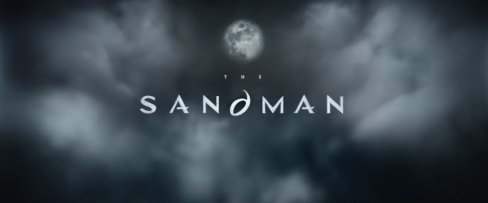 Although I'm a big Neil Gaiman fan, I've never read The Sandman, as I just can't relate to comic books and graphic novels. I'm not a very visual person, and I like a story to contain (far) more words. Nonetheless, I was aware it was considered something of a big thing in the genre, so watched the Netflix version with interest.
Although I'm a big Neil Gaiman fan, I've never read The Sandman, as I just can't relate to comic books and graphic novels. I'm not a very visual person, and I like a story to contain (far) more words. Nonetheless, I was aware it was considered something of a big thing in the genre, so watched the Netflix version with interest.The first episode is distinctly on the slow side - I know at least one person who gave up part way through - but it's worth persevering to make your mind up, as things certainly change gear after a while. However, I do think the series has an underlying problem in the way it has apparently been painstakingly based on the individual comics. This gives an extremely episodic approach, making it almost impossible to produce a really top notch drama series.
The problem is not having mostly separate stories in each episode - I like that. But if a series is take that approach, it needs two other things to support it - a group of good recurring characters and a strong story arc across the series. It's even better if it can also incorporate humour despite the subject matter - that's why Buffy the Vampire Slayer was so brilliant. That had all these elements. But The Sandman lacks most of them.
I really thought things were improving with the introduction of Jenna Coleman's character in the third episode. Johanna Constantine is a perfect foil for Tom Sturridge's well played, but frankly morose Dream/Morpheus. There was enjoyable interaction between main characters and that humour gave useful contrast with the darkness elsewhere. And then she was gone for the rest of the series (except a cameo as her ancestor). I also wanted to see far more of Vivienne Acheampong's excellent librarian, Lucienne. Unless Netflix fixes this with more recurring characters that appear in most episodes, this series won't hit the spot.
It's not that there can't be one-off episodes dedicated to a specific event and key character. Episode 6, featuring Dream's sister Death and a human who the pair grant a free pass from death in the fourteenth century, who Dream meets up with once every hundred years, is brilliant. But, for example, the fifth episode, primarily featuring a secondary character in a diner is just dull. And when a continuing story kicks in across episodes 7 to 10 (still not a proper series story arc) it has too much material not set in the real world, is convoluted and lacks the humour and energy of the Constantine episode. It's plodding by comparison.
Overall, the CGI is okay, but lightweight in places. The buildings in the Dreaming never looked real, and though you could argue that's how they should look in the Dreaming, it didn't appear to be intentional. The biggest CGI disappointment was the gargoyle Gregory in the Cain and Abel sequence of episode 2 - it was good in close up, but when flying it looked like something out of a video game. I do have one other moan on the visuals - the nighttime sequences, of which there are a lot, are very low contrast - even with my TV in dynamic mode it was sometimes difficult to make out what was going on.
Overall, interesting concept, occasional good episode, but needs a serious overhaul.
See all of Brian's online articles or subscribe to a weekly digest for free here
October 15, 2022
Drowning in SEO spam
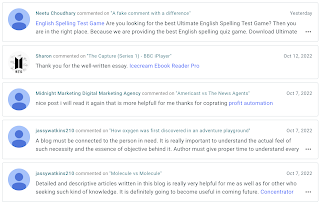 If you don't have a website, you are probably lucky enough not to be bombarded with emails promising to improve your SEO (Search Engine Optimisation). Here's a typical example that I received recently:
If you don't have a website, you are probably lucky enough not to be bombarded with emails promising to improve your SEO (Search Engine Optimisation). Here's a typical example that I received recently:
I have looked at your website and realize your website is great design but your website ranking not good all search engine Google, AOL, Yahoo, and Bing.
Do you want more targeted visitors on your website?
We can place your website on Google's 1st page. Yahoo, Facebook, LinkedIn, YouTube, Instagram, Pinterest etc.).
We also offer the most competitive rates for this service, May I send you quote?
What is a bit scary (apart from the grammar) is the sheer volume of this stuff I receive. Thankfully, my spam filter is pretty good at clearing them out of my inbox, but one day this week, for example, I received 20 such emails, and rarely get fewer than ten a day.We can only assume that some companies respond to this bombardment, or why would the spammers bother? And when they do, it can result in potentially respectable companies being hauled into the mire. Because, sadly, some of the less salubrious SEO companies try to get better search engine ranking by... spamming.
Specifically, they attempt to put comments on blog posts like this one with links to their customers' websites, as a result, in theory, pushing the clients' sites a little up the search engine ranking. Traditionally, those spam posts have been for something generic, such as the ones in the image at the top (shown larger below so you can read some of their purple prose (I particularly like 'thanks for coprating profit automation'.)

But lately I have been getting a few for what appear to be ordinary, presumably honest, UK companies that have been taken in by these spammers. When I do get a dodgy comment linked to what appears to be a genuine company I always email them to point out what is happening - but I am yet to have a reply from any of those I have alerted. This is the kind of thing:

The trouble is, if you want to be, say, the 'most trusted air conditioning & heating engineer service' anywhere, it's not a good look if someone is spamming in your name. Here's another example:

Note, by the way, the sheer irrelevance of the comments to the subjects of the blog posts. It's not just comment spamming, it's bad comment spamming.
So if your company pays for SEO and you get someone complaining about this happening, don't ignore them. Apologise and sack your SEO company. You know it makes sense.
October 5, 2022
Hydrogen? No thanks...
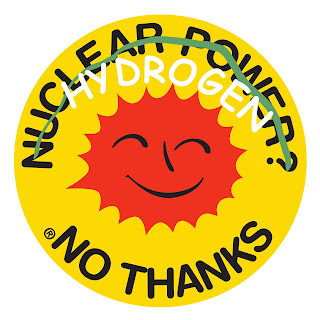 Image by Anne Lund from Wikipedia
Image by Anne Lund from Wikipediareproduced and modified under GNU 1.2I've always found the old anti-nuclear badge hilarious. It might say 'Nuclear Power? No Thanks', but its central image of the smiling sun portrays the biggest nuclear reactor within several light years. But I can't resist adapting it as a comment on the over-enthusiasm for some applications of hydrogen in green energy.
Don't get me wrong, hydrogen is a wonderful element - literally the number one. There is a specific irony in my use of that image because, of course, hydrogen is the fuel of that vast nuclear reactor that keeps us alive - and, for that matter, it's one of the two component elements of the water that is essential for life.
I am also not denying that hydrogen has a useful role in the future green economy. It's often mis-described as an energy source. It's actually an energy store, and as such could be useful as a way of storing away renewable energy. For example, solar energy can be used when the Sun is not shining by producing hydrogen at power stations that is later cleanly burned. It is also a potential fuel for large, specialist vehicles if batteries are not a sensible option, such as long range buses, lorries and possibly aircraft.
However, there are two 'green energy' applications of hydrogen that are still mentioned but that have serious problems.
One is in cars. The Grand Tour presenters (formerly of Top Gear) have frequently praised hydrogen as a petrol replacement, in opposition to electric cars. But for me it has three issues. One is it's even less safe to handle and live with than petrol. A second that it has lower energy density than petrol, so you get less range for the same tank size. But the biggest one is that hydrogen ties us to fuel stations. We already have a much bigger distribution network for electricity. When, many years ago, I had a Mondex card, the original experimental cashless card, its biggest plus was I could top it up at home - I didn't have to go somewhere to get cash. The same applies to electric cars. Of course they need to be cheaper and with better range, but that will come. But who would want to keep filling stations if we could get away from them?
The other problematic application is using hydrogen as a replacement for gas heating in homes. The idea is that you put hydrogen down the same pipes we currently put natural gas down - so, like electricity, the distribution network is already there to the point of use. Sounds great. But I was always worried that hydrogen, which is better at leaking than natural gas would find far too many ways of escaping... and I'd rather get away from pumping highly flammable substances into the home.
Now, though, there's a second and even more convincing reason - it's not a cheap solution, nor is it even particularly green. This isn't a comment from an alarmist source, it's the outcome of a review of 32 independent studies, reported in Chemistry World. As the original study notes 'it takes about five times more electricity to heat a home with hydrogen than it takes to heat the same home with an efficient heat pump, either individually or as part of a district heating network.' This is not the green future.
This has been a Green Heretic production.
See all of Brian's online articles or subscribe to a weekly digest for free here



